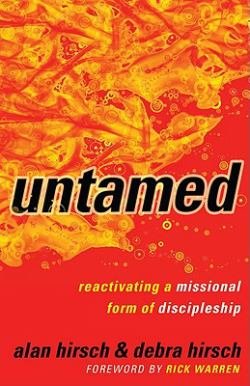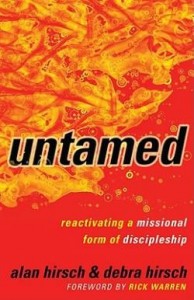 Almost finished with my review of the Hirsch’s very fine book Untamed: Reactivating Missional for  of Discipleship. See Part 1, Part 2. If you’ve been tracking with me, I’ve had very good things to say about this new work. It combines the theological and the practical in a very creative, helpful way. I will offer some constructive criticism in my next and final post.
Almost finished with my review of the Hirsch’s very fine book Untamed: Reactivating Missional for  of Discipleship. See Part 1, Part 2. If you’ve been tracking with me, I’ve had very good things to say about this new work. It combines the theological and the practical in a very creative, helpful way. I will offer some constructive criticism in my next and final post.
Spirit-led Discipleship (most of us don’t experience it)
As someone who aspires to a robust trinitarian faith, I gravitate to good treatments of the Holy Spirit. Chapter 3 offers us just that, not in a work of pure theology or exegesis, but as a compelling, creative, and culturally savvy reflection on the person and work of the Spirit in the missional church. The Hirsches write: “Discipleship is birthed in the Spirit, but it is also very much maintained in the Spirit.”
Unfortunately, there are theological camps that cut him right out of spiritual life. Even some of the circles I run in, I find a serious neglect of the Spirit, as if “the gospel” substitutes for the Spirit. The gospel is not the Gospel of Jesus Christ. It is the Gospel of God, a trinitarian God–Father, Son and Spirit. I have addressed this at length in Spirit-led Ecclesiology: Following the Spirit through Church Planting (new article on this forthcoming). But perhaps the more threatening aspect of missional church to Spirit-led discipleship is our reliance on models, methods, and books. In a word, “technique,” which is a terrible substitute for God, the Spirit. The Spirit does much more that regenerate.
The Creative Holy Spirit
“The Holy Spirit is the most creative person in the universe.”
This quote has stuck with me for weeks. It prods me to write more, dream more, create more, rely on the Spirit more. On Sunday I was praying that the Spirit would stretch his wings over our congregation and flap new life and healing into our people. He did it in the beginning (Gen 1); he did it with Israel (Deut 32); he did and continues to do it with the Church (Acts 2).
The Hirsch’s point out that the “Holy” Spirit is set on making more than our morality holy. The Spirit wants to release powerful, creative waves of mission through disciples of Jesus, but before he can, we must repent of our sinful dependence on comfort, convenience, and technique. Once we do, the Spirit can release a “sanctified imagination” that envisions and enacts an entirely new way of living that brings hope in all places to all people. The Spirit produces “lots of little Jesuses” that bring hope and renewal into our present world.
Let’s repent for neglecting and assuming the presence and power of the Holy Spirit. Let’s turn to his creative, sanctifying power to envision new neighborhoods and cities, wonderfully transformed by the Spirit of God through the disciples of Christ.
 At our inaugural PlantR Microconference, we are hosting Alan Hirsch on the topic of Missional Discipleship. Session 2 is on Incarnational Mission (how to make disciples).
At our inaugural PlantR Microconference, we are hosting Alan Hirsch on the topic of Missional Discipleship. Session 2 is on Incarnational Mission (how to make disciples).
 m getting rocked on discipleship these days. From my positive experiences in the pub, in the projects or in God’s presence to a deepening desire for more disciples, more discipleship, more life sharing on mission. God is using the Hirsch’s book to call me into deeper missional discipleship—making disciples while on mission.
m getting rocked on discipleship these days. From my positive experiences in the pub, in the projects or in God’s presence to a deepening desire for more disciples, more discipleship, more life sharing on mission. God is using the Hirsch’s book to call me into deeper missional discipleship—making disciples while on mission.
